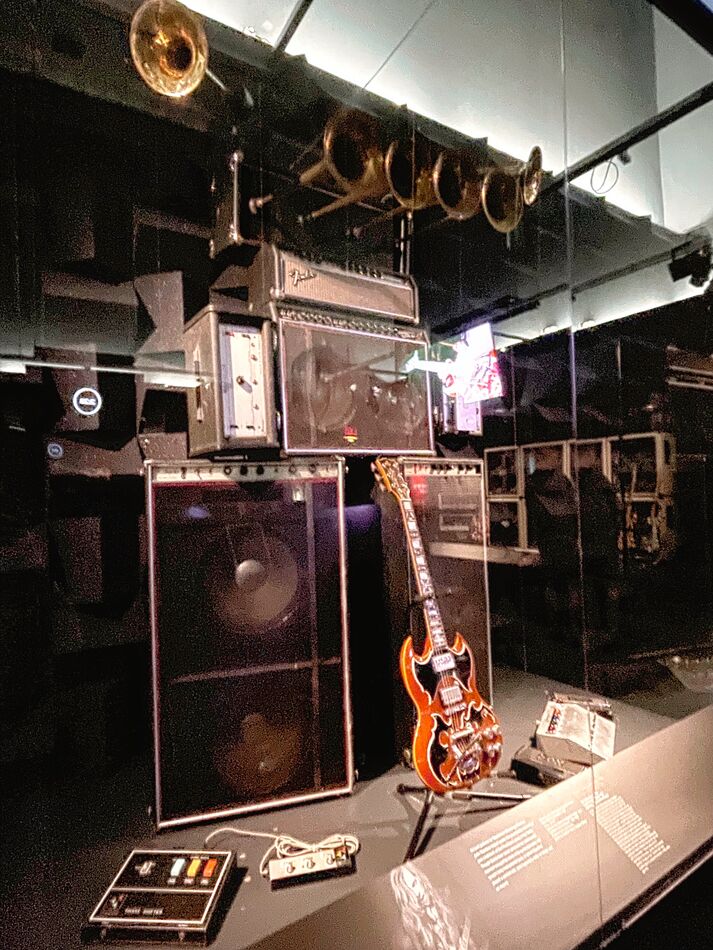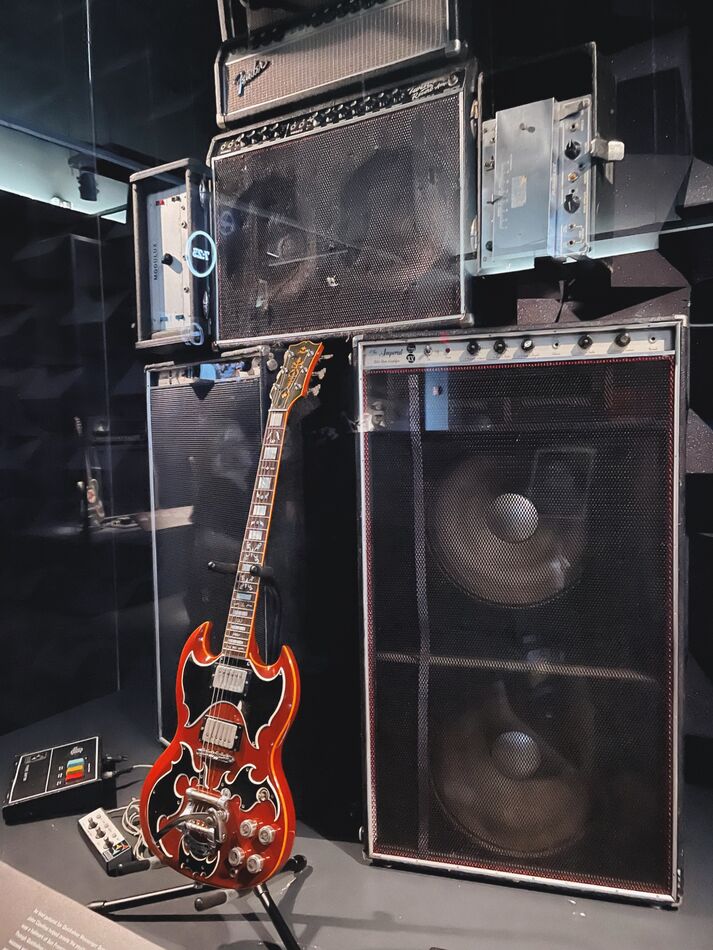Removing Reflected Images?
Jul 9, 2022 12:43:17 #
I took some photos this week at the Rock and Roll Hall of Fame in Cleveland, OH this week. Almost all of the displays are behind glass. In some case, such as the photos below, the glass is reflecting images from other displays. I have found that in some cases, a ND filter can eliminate most, if not all, reflected images, but I had none with me. So I'm wondering if there is a way to remove (or at least minimize) them in post-processing?
(For the curious, the photos are of the unique amplification rig designed and developed by guitarist John Cipollina, one of the leading guitar players in the heyday of San Francisco's acid-rock sound).
(For the curious, the photos are of the unique amplification rig designed and developed by guitarist John Cipollina, one of the leading guitar players in the heyday of San Francisco's acid-rock sound).
The reflection in the image is from a neighboring Van Halen exhibit

(Download)
Better, but you can still see "ghost" reflections in the top speaker cabinet

(Download)
Yeah well, I just thought I'd add this one for effect

(Download)
Jul 9, 2022 12:45:26 #
Jul 9, 2022 12:51:34 #
Jul 9, 2022 12:57:53 #
Jul 9, 2022 13:38:46 #
Just Fred wrote:
I took some photos this week at the Rock and Roll ... (show quote)
A circular polarizer "may" help. If the angle of incidence of the reflection is around 56° it will work, otherwise it will just reduce light by up to two stops, and you'll have to raise ISO, open the aperture on the lens and/or use a slower shutter speed.
Jul 9, 2022 13:54:55 #
Gene51 wrote:
A circular polarizer "may" help. If the angle of incidence of the reflection is around 56° it will work, otherwise it will just reduce light by up to two stops, and you'll have to raise ISO, open the aperture on the lens and/or use a slower shutter speed.
Better than a ND though.
Jul 9, 2022 13:56:50 #
Just Shoot Me
Loc: Ithaca, NY
Najataagihe wrote:
Original ULHgo Ultimate Lens Hood - if you can touch the glass.
That would be great if you were shooting out a window trying to take in a city scape. Shooting an exhibit with that hood would require a fish eye lens. Not really apropos.
Ron
Jul 9, 2022 14:16:05 #
Works great in zoos and aquariums with just about any lens.
Up close and personal?
My 10mm-20mm zoom works well, in most cases.
Is it the answer for all circumstances?
Of course, not.
Up close and personal?
My 10mm-20mm zoom works well, in most cases.
Is it the answer for all circumstances?
Of course, not.
Jul 9, 2022 14:31:06 #
Najataagihe wrote:
Works great in zoos and aquariums with just about any lens.
Up close and personal?
My 10mm-20mm zoom works well, in most cases.
Is it the answer for all circumstances?
Of course, not.
Up close and personal?
My 10mm-20mm zoom works well, in most cases.
Is it the answer for all circumstances?
Of course, not.
Uhh, no. Nope. Not gonna help at all in the OP’s case.
Jul 9, 2022 14:54:32 #
A neutral density filter will not alter reflections. It will just absorb light and allow for wider apertures and/or slower shutter speeds when required for effect.
A Circular Polarizer (CPL) filter will eliminate some or all reflections depending on the incidence of the light source, as Gene51 points out. The good news is, that you do not necesserally need to calculate angles because you can see the effect as you rotate the filter and oftentimes simply changing up your camera position will allow the polarizing effect to kick in. In some cases, it helps to shoot through glass pr Plexiglas at an oblique angle as if you were photographing a mirror image.
The CPL filer als provides neutral density so you will lose about 2 stops. In lower light, you may need to boost your IOS setting to accommodate the light absorption.
Polarizing filters work quite well in reflection negation and mitigation once you get the feel of them and how they work. I have used them for many years to shoot storefront displays, diorama exhibits at museums and images framed behind glass.
A CPL filter will also darken skyscapes and help accentuate clouds, and control reflections from foliage and other surfaces thereby enhancing colour saturation.
If you decide to purchase a CPL filer, make sure to get a high-quality one that will not distort colours or cause other artifactual interferences. I suggest buying the one to fit your largest lens diameter and using adapters for smaller lenses. Some better brands are B+W, Schneider, Hoya, and Sing-Ray There are other current brands on the market as well.
Nowadays, with digital cameras, one does not need as many filters as back in the film era. Colour balance can be addressed in the cameras' whte balance settings and many of the old filter effects can be had in post-processing. A CPL filter is a good investment because its effect can not be achieved in post-processing and it has many usages in reflection control, copy and reproduction work, and landscape photography. As I previously mentioned, you can SEE the effect or lack thereof right in the viewfinder as you rotate the filter. What you see, as reflection control, is what you get!
The term "circular" pertains to the filter being optically designed for modern digital cameras. The older LINEAR polarizers can interfere wth digital cameras' auto-focus and/or exposure control accuracy.
A Circular Polarizer (CPL) filter will eliminate some or all reflections depending on the incidence of the light source, as Gene51 points out. The good news is, that you do not necesserally need to calculate angles because you can see the effect as you rotate the filter and oftentimes simply changing up your camera position will allow the polarizing effect to kick in. In some cases, it helps to shoot through glass pr Plexiglas at an oblique angle as if you were photographing a mirror image.
The CPL filer als provides neutral density so you will lose about 2 stops. In lower light, you may need to boost your IOS setting to accommodate the light absorption.
Polarizing filters work quite well in reflection negation and mitigation once you get the feel of them and how they work. I have used them for many years to shoot storefront displays, diorama exhibits at museums and images framed behind glass.
A CPL filter will also darken skyscapes and help accentuate clouds, and control reflections from foliage and other surfaces thereby enhancing colour saturation.
If you decide to purchase a CPL filer, make sure to get a high-quality one that will not distort colours or cause other artifactual interferences. I suggest buying the one to fit your largest lens diameter and using adapters for smaller lenses. Some better brands are B+W, Schneider, Hoya, and Sing-Ray There are other current brands on the market as well.
Nowadays, with digital cameras, one does not need as many filters as back in the film era. Colour balance can be addressed in the cameras' whte balance settings and many of the old filter effects can be had in post-processing. A CPL filter is a good investment because its effect can not be achieved in post-processing and it has many usages in reflection control, copy and reproduction work, and landscape photography. As I previously mentioned, you can SEE the effect or lack thereof right in the viewfinder as you rotate the filter. What you see, as reflection control, is what you get!
The term "circular" pertains to the filter being optically designed for modern digital cameras. The older LINEAR polarizers can interfere wth digital cameras' auto-focus and/or exposure control accuracy.
Jul 9, 2022 14:58:50 #
Gene51 wrote:
A circular polarizer "may" help. If the angle of incidence of the reflection is around 56° it will work, otherwise it will just reduce light by up to two stops, and you'll have to raise ISO, open the aperture on the lens and/or use a slower shutter speed.
Now you made me think. See what you did?
Ok I suppose the reason for the 56 degree is this ?
http://physics.bu.edu/~duffy/sc545_notes08/brewster.html
Jul 9, 2022 15:06:41 #
If you can't reshoot with a CPL (an ND filter has no reflection reduction abilities that I know of) then you are probably looking at a lot of tedious work with the clone tool, and maybe content-aware fill.
Jul 9, 2022 16:22:32 #
Just Fred wrote:
I took some photos this week at the Rock and Roll ... (show quote)
Beautifully documented 🏆🏆🏆🏆🏆
Jul 9, 2022 16:50:59 #
cahale
Loc: San Angelo, TX
Rongnongno wrote:
Reshoot with a CPL.
I didn't see any request for suggestions to reshoot. He's asking for help with what he has. And sadly, my answer to his question is no, you really can't.
Jul 9, 2022 17:04:38 #
cahale wrote:
I didn't see any request for suggestions to reshoot. He's asking for help with what he has. And sadly, my answer to his question is no, you really can't.
No easy way, but if he has clone tool skills, plenty of time, and patience, he could do a pretty good fix.
If you want to reply, then register here. Registration is free and your account is created instantly, so you can post right away.









